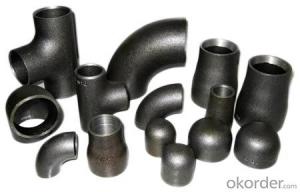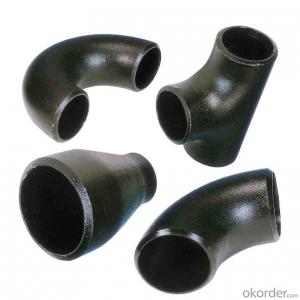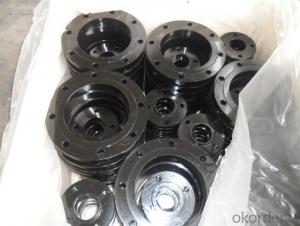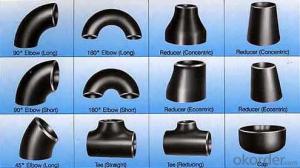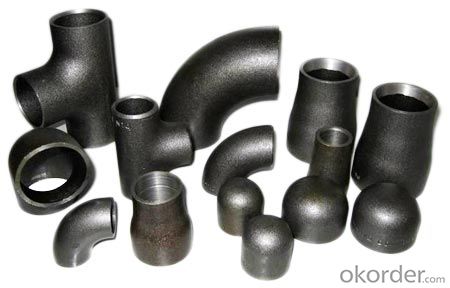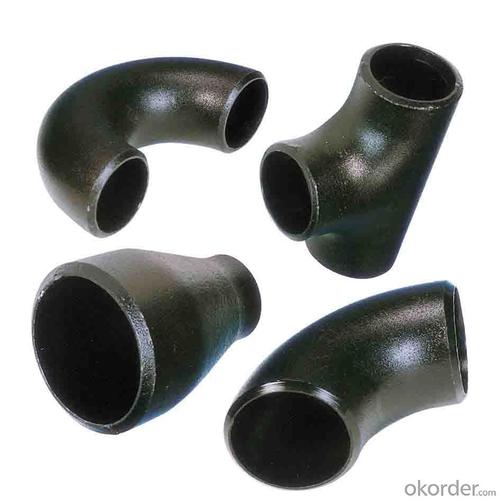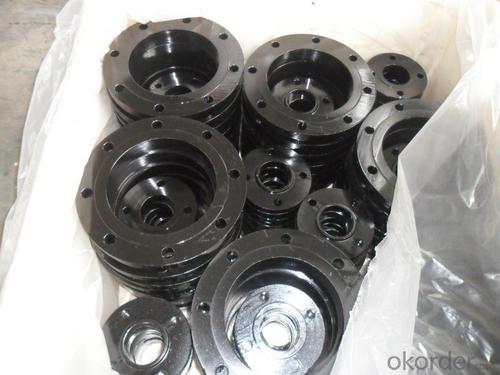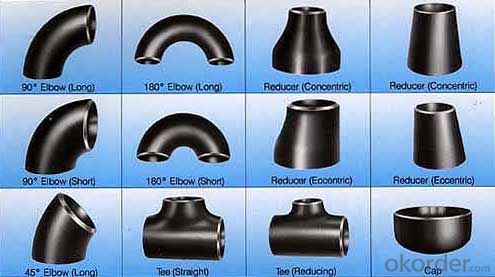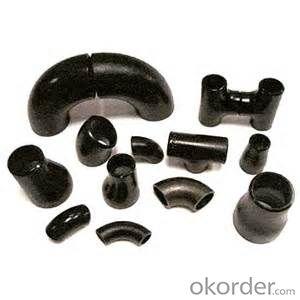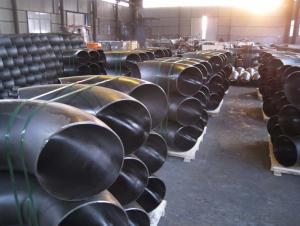CARBON STEEL PIPE FITTINGS ASTM A234 TEE 2''
- Loading Port:
- Tianjin
- Payment Terms:
- TT OR LC
- Min Order Qty:
- 1 m.t.
- Supply Capability:
- 30000 m.t./month
OKorder Service Pledge
OKorder Financial Service
You Might Also Like
Specifications
1.we produce seamless steel pipe
2.size:48-219*4.5-45mm
3.ISO 9000 approved
4.Market:south/east Asia,Mid-east,South America
seamless steel pipe
Material J55 K55 N80 L80 P110.etc
Standard ASTM JIS
Usage conveying oil gas ,oil pipe line,pipe material collar,oil nature gas,
Packing wooden cases or wooden pallet ,export standard package
Others:Special design available according to requirement
Anti-corrosion available and high temperature resistence
Delivery time 30days
Payment term T/T L/C
Name | API oil casing pipe | ||||
Out Diameter | Wall thickness | Material | Thread | Length | |
in | mm | ||||
5 1/2 | 139.7mm | 6.20 | J55/K55/N80 | LTC/STC/BTC | R2 |
6.98 | |||||
7.72 | |||||
9.17 | |||||
10.54 | |||||
6 5/8 | 168.28mm | 7.32 | J55/K55/N80 | LTC/STC/BTC | R2 |
8.94 | |||||
10.59 | |||||
12.06 | |||||
12.06 | |||||
8 5/8 | 219.08 | 8.94 | H40 | S/L/B | 9 5/8R2 |
J55/K55 | S/L/B | ||||
10.6 | L80 | L/B | |||
12.7 | L80 C95 | L/B | |||
14.15 | P110 | L/B | |||
9 5/8 | 244.48 | 13.84 | J55 K55 | R2 | |
15.11 | L80 | L/B | |||
10 3/4 | 273.05 | 11.43 | J55 K55 | S/B/E | R2 |
13.84 | P110 | S/B | |||
15.11 | P110 | S/B | |||
11 3/4 | 298.45 | 12.19 | J55 K55 | S/B | R2 |
10.96 | J55 K55 | S/B | |||
13 3/8 | 339.72 | 12.19 | J55 K55 L80 | S/B | R2 |
10.92 | J55 K55 | S/B | |||
13.06 | L80 | S/B | |||
Coupling and thread can be required according to customer requirment
- Q: What are the different methods of pipe lining for steel pipes?
- There are several different methods of pipe lining for steel pipes, each with its own unique features and benefits. These methods include: 1. Spray lining: In this method, a specially formulated coating is sprayed onto the interior surface of the steel pipe. The coating adheres to the pipe and forms a protective barrier against corrosion and chemical damage. Spray lining is relatively quick and cost-effective, making it a popular choice for smaller diameter pipes. 2. Cured-in-place pipe lining (CIPP): CIPP involves inserting a flexible liner into the steel pipe and then curing it in place using steam or hot water. This method creates a seamless and durable lining that restores the structural integrity of the pipe. CIPP is commonly used for larger diameter pipes and can be installed without the need for excavation. 3. Slip lining: Slip lining involves inserting a slightly smaller diameter pipe into the existing steel pipe. The annular space between the two pipes is then grouted or filled with a cementitious material. This method is effective in rehabilitating pipes with minor defects or damages and can significantly increase the pipe's lifespan. 4. Fold-and-form lining: In this method, a flexible liner is inserted into the steel pipe and then expanded to the pipe's diameter using a mechanical or hydraulic process. The liner is then folded and formed to fit the contours of the pipe before being cured in place. Fold-and-form lining is ideal for pipes with irregular shapes or bends. 5. Coating lining: Coating lining involves applying a protective coating to the interior surface of the steel pipe. The coating can be sprayed, brushed, or rolled onto the pipe's surface and provides a barrier against corrosion and chemical damage. This method is commonly used for large diameter pipes or pipes in harsh environments. Each of these methods has its own advantages and disadvantages, and the choice of the lining method will depend on factors such as pipe diameter, condition, budget, and project requirements. It is important to consult with a professional pipe lining contractor to determine the most suitable method for a specific steel pipe rehabilitation project.
- Q: Can steel pipes be used for structural supports?
- Yes, steel pipes can be effectively used as structural supports due to their high strength, durability, and ability to withstand heavy loads.
- Q: What is the difference between steel pipes and concrete pipes?
- Steel pipes and concrete pipes differ in terms of their material composition and physical characteristics. Steel pipes are made from steel alloys, which make them strong, durable, and resistant to corrosion. They have high tensile strength, allowing them to withstand high-pressure applications. Steel pipes are commonly used in industries such as oil and gas, plumbing, and construction. On the other hand, concrete pipes are made from a mixture of cement, aggregates, and water. They are known for their exceptional compressive strength and durability. Concrete pipes are commonly used in sewage systems, drainage systems, and culverts. In terms of installation, steel pipes are lightweight and easy to handle, making them more convenient to transport and install. Concrete pipes, on the other hand, are heavier and require specialized equipment for installation. Additionally, steel pipes have a smooth internal surface, which allows for efficient flow of fluids or gases. Concrete pipes, however, have a rougher internal surface, which may cause more friction and result in reduced flow rates. Overall, the choice between steel pipes and concrete pipes depends on the specific requirements of the project, including factors such as application, budget, and durability needs.
- Q: Can steel pipes be recycled and used for other purposes?
- Yes, steel pipes can be recycled and used for other purposes. Steel is a highly recyclable material, and steel pipes are no exception. Recycling steel pipes helps to conserve natural resources and reduce the demand for new steel production. When steel pipes are recycled, they are typically sent to a recycling facility where they are sorted, cleaned, and processed. The pipes are then crushed into smaller pieces or melted down to be reshaped into new steel products. Recycled steel pipes can be used for a variety of purposes. They can be used in construction projects, such as for building bridges, roads, or buildings. They can also be used in the manufacturing of new steel products, such as automotive parts, appliances, or furniture. Additionally, recycled steel pipes can be used in the energy sector, for example, in the production of wind turbines or oil and gas pipelines. Using recycled steel pipes not only helps to reduce waste and conserve resources but also has environmental benefits. The recycling process requires less energy and produces fewer greenhouse gas emissions compared to the production of new steel. Therefore, recycling steel pipes is a sustainable option that contributes to a circular economy and helps to protect the environment.
- Q: How are steel pipes protected against external damage?
- Steel pipes are protected against external damage through various methods such as coating them with protective materials like polyethylene or epoxy, using cathodic protection techniques, and implementing physical barriers like concrete encasement or pipe sleeves. These measures help prevent corrosion, impact, and abrasion, ensuring the durability and longevity of the steel pipes.
- Q: What are the different types of corrosion that can affect steel pipes?
- There are several types of corrosion that can affect steel pipes, including general or uniform corrosion, pitting corrosion, galvanic corrosion, crevice corrosion, and stress corrosion cracking.
- Q: How are steel pipes used in the chemical industry?
- Steel pipes are extensively used in the chemical industry for various applications, including transportation of chemicals, gases, and liquids. They are highly durable, corrosion-resistant, and can withstand high pressure and temperature conditions. Steel pipes are used in chemical plants for the transfer of raw materials, intermediate products, and final products within the production process. They are also employed for the distribution of utilities such as water, steam, and compressed air. Additionally, steel pipes are utilized for the construction of storage tanks, reactors, and other equipment in the chemical industry due to their strength and reliability.
- Q: What is lined pipe?
- Is the coating of the inside of the pipe, such as pipe conveying sulfuric acid will corrode, corrosion, but soft plastic pipe, buried in the ground to wall thicker, then you can use the liner and characteristics of hard for using steel pipe laying, sheathed in the steel pipe into the thin plastic tube, it can transport the sulfuric acid,
- Q: What are the different methods of protecting steel pipes from corrosion?
- There are several methods of protecting steel pipes from corrosion. One common method is coating the pipes with materials such as epoxy, polyethylene, or fusion bonded epoxy, which create a barrier between the pipe's surface and corrosive elements. Another method is cathodic protection, which involves using sacrificial anodes or impressed current to prevent corrosion. Additionally, applying corrosion inhibitors or using corrosion-resistant alloys for manufacturing the pipes can provide protection. Regular maintenance, including inspections and cleaning, is also crucial to ensure the ongoing protection of steel pipes from corrosion.
- Q: Are steel pipes suitable for food processing facilities?
- Yes, steel pipes are suitable for food processing facilities. Steel pipes are widely used in the food processing industry due to their numerous benefits. Firstly, steel pipes are highly durable and can withstand high temperatures, pressures, and corrosive substances often used in food processing. This ensures the pipes will not degrade or contaminate the food products. Additionally, steel pipes are easy to clean and maintain, making them ideal for maintaining high levels of hygiene required in food processing facilities. Steel pipes also have excellent resistance to bacteria growth, further ensuring the safety and quality of the food being processed. Furthermore, steel pipes are cost-effective and have a long lifespan, making them a reliable and economical choice for food processing facilities. Overall, steel pipes are a suitable and preferred option for food processing facilities due to their durability, cleanliness, and resistance to contamination.
Send your message to us
CARBON STEEL PIPE FITTINGS ASTM A234 TEE 2''
- Loading Port:
- Tianjin
- Payment Terms:
- TT OR LC
- Min Order Qty:
- 1 m.t.
- Supply Capability:
- 30000 m.t./month
OKorder Service Pledge
OKorder Financial Service
Similar products
Hot products
Hot Searches
Related keywords
